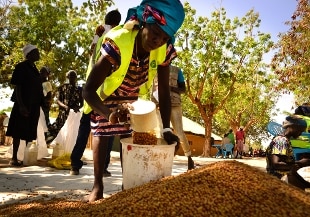Oxfam: international aid for Yemen halved
Oxfam: "Fortress Europe continues to close in on itself"
Share
October 13, 2020 55 million people, in 7 countries, are on the brink of
famine
as a result of conflicts, extreme inequalities and pandemics.
This was stated by Oxfam, the international confederation of non-profit organizations dedicated to reducing global poverty through humanitarian aid and development projects, in the new report entitled "Later it will be too late".
On the eve of World Food Day and the World Food Security Committee (CFS), Oxfam appeals to
the international community
for full funding of the United Nations Response Plan to Covid which would make it possible for humanitarian organizations to intervene in these countries.
There are 7 countries most affected by the food crisis in the world:
Yemen, Nigeria, Burkina Faso, South Sudan, Afghanistan and the Democratic Republic of Congo
.
In five of these - while the number of people affected by
extreme
malnutrition
continues to increase - the funding in support of the United Nations Response Plan, of over 10 billion dollars, is still at zero.
In Yemen, over 7 million people depend on
food aid to survive
and over 2 million in the south of the country are literally exhausted;
in Nigeria
nearly 8 million people affected in the north of the country, devastated by years of violence;
in Burkina Faso and Somalia nearly 7 million do not have enough food;
in the Democratic Republic of Congo, 21 million are suffering from severe malnutrition.
"The Nobel Prize awarded a few days ago to the
World Food Program
sounds like an alarm: Covid has triggered an economic catastrophe in the poor part of the world and hunger could make more victims than the virus itself", said Francesco Petrelli, senior policy advisor for the development finance of Oxfam Italia.
At the moment, rich countries have pledged to allocate just 28% of the amount requested by the United Nations, for the general response to the
Covid
emergency
in the world.
"The consequence is that essential resources are lacking to guarantee as many people as possible in developing countries care, access to clean water and sanitation, gender equality", continued Petrelli.
"But among all, the most underfunded area of intervention is the one that should prevent the worsening of
the current food crisis
. A crucial objective for which just 10% of the resources needed globally have been allocated. With the result, for example. , that Burkina Faso has so far been able to help just half of the population that depends on humanitarian aid to survive ".
In 2020, the pandemic triggered a perfect storm in the most vulnerable regions of the world, but the first goal should be to save and
keep as
many people
alive
as possible.
The Food Safety Committee (CFS) must sound an alarm within the UN about the imminence of famine and how little is being done about it.
"In July we warned that by the end of the year the hunger generated by Covid would have made more victims of the same pandemic. It is clear that the funds spent in the prevention system that already exist, not only save lives today, but break the vicious and costly circle between
poverty and hunger
, restoring hope for the future ", Petrelli insisted.
"The international community should fully fund the UN appeal and take stronger political action to support the
global ceasefire
called for by the Secretary General. We must once and for all break the deadly link between the war on hunger. Just think about it. that in 80 out of 100 countries, where UN agencies intervene, conflicts are ongoing ", concluded Petrelli.
Since the beginning of the pandemic, Oxfam has brought food, clean water and basic necessities to 4.5 million people in the poorest and most conflict-ridden areas of 62 countries: from Yemen, to Africa, to the Sahel, to Afghanistan.
Oxfam aims to reach 14 million people within the year.

